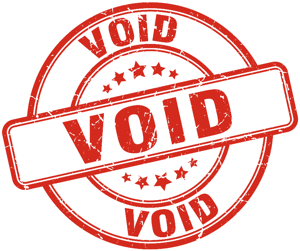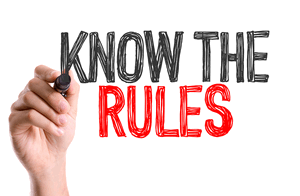 In the world of betting, if something seems too good to be true then it almost certainly is. If you’ve ever looked at odds offered by a bookmaker and thought that they couldn’t be right then you’re probably correct and the bookie in question has simply made a mistake.
In the world of betting, if something seems too good to be true then it almost certainly is. If you’ve ever looked at odds offered by a bookmaker and thought that they couldn’t be right then you’re probably correct and the bookie in question has simply made a mistake.
Sadly, there are rules in place in betting companies’ terms and conditions to mean that we don’t get to take advantage of said mistakes.
That rule is called a ‘palpable error’, which is another way of saying ‘obvious mistake’. On the occasions that bookmakers make such an error, they’re covered to not have to pay out on wagers placed by eagle-eyed punters.
The easy way to spot such a mistake is by looking to see what odds other bookies have the outcome at and unless they’re broadly in line with each other, it’s a palpable error.
Defining An ‘Obvious’ Mistake
 It goes without saying that what a punter might call a mis-priced market, a bookmaker would call a mistake. The nature of palpable errors is such that it is a grey area, with no set rules in place to define what fits into that category. If every single bookie in the business has a horse priced at 7/2 and one has them as 10/1, is that an obvious error? They’ve certainly claim it is, but that’s not the same thing.
It goes without saying that what a punter might call a mis-priced market, a bookmaker would call a mistake. The nature of palpable errors is such that it is a grey area, with no set rules in place to define what fits into that category. If every single bookie in the business has a horse priced at 7/2 and one has them as 10/1, is that an obvious error? They’ve certainly claim it is, but that’s not the same thing.
In truth, most punters know when a bookmaker has made a mistake in their pricing up of a market. The majority of palpable errors are ones where most bookies are offering odds of 7/2 but one has offered 72/1, for example, or the market generally has a football team as 20/1 to win a tournament except for the outlier putting them at 200/1. Most bettors, understandably, believe the error has to be as clear as those two to be called a ‘palp’.
It’s hard to define what makes a palpable error, but really it comes down to what the rest of the betting world are offering. If you’ve got ten bookmakers offering odds of 2/7 and one with 7/2 then it’s fair to say that the odd one out is a palpable error. Unfortunately, bookmakers themselves are the ones that decide what makes an error an ‘obvious’ one and there’s nothing in writing to define what that means.
If you have placed a bet convinced that you’ve got an amazing price then the likelihood is that your bet will be made void on the grounds of it being a palpable error. It might not seem fair, but it’s the way that the betting industry works. You have to remember that bookmakers are dealing with tens if not hundreds of thousands of bets every day, so the occasional mistake will happen but they shouldn’t be punished for it.
The Punters’ Recourse
 Just because bookmakers are the arbiters of what makes a palpable error doesn’t mean that punters have no recourse on the occasions that a bookie has scrubbed their bet. The Independent Betting Adjudication Service is specifically there to help in the instances that a bettor feels as though a bookmaker has played fast and loose with the decision making around the legality and fairness of a bet.
Just because bookmakers are the arbiters of what makes a palpable error doesn’t mean that punters have no recourse on the occasions that a bookie has scrubbed their bet. The Independent Betting Adjudication Service is specifically there to help in the instances that a bettor feels as though a bookmaker has played fast and loose with the decision making around the legality and fairness of a bet.
The things that you need to remember about IBAS, though, is that you need to make sure that you’ve exhausted all other options before turning to them. That means communicating with the bookie in question and going through their processes in order to try to resolve the situation that you find yourself in. Even then, the likelihood is that IBAS will side with the bookmaker, especially when it comes to palpable errors.
IBAS’s rule of thumb when it comes to palpable errors is best summed up by the following sentence:
“Panellists will consider whether the error would have been discernible to a customer with a reasonable knowledge of betting and the sport in question.”
In other words, if a regular bettor will have been able to figure out that the bet wasn’t quite right then it’s going to be declared to be a palpable error. It’s not something that most punters think is fair, comparing it to the idea of a high street shop charging your card more money after you’ve made a purchase because they decided that they priced the item you bought up incorrectly.
Whether you think that’s a fair comparison or not will probably depend on which side of the palpable error debate you come down on. If you went into the Apple Store and saw that they had a MacBook on sale for £100, you’d know that they’d priced it up incorrectly. That being said, if they then sold it to you they couldn’t charge your card another £900 after the fact. It’s their responsibility to make sure it’s right before accepting the sale, so should the same be true of bookmakers?
There’s an argument that punters might wish to avoid IBAS altogether and head straight to the small claims court in the event of a palpable error. Some believe that palpable errors are illegal terms and conditions for bookmakers to apply, with contract law saying that error can be corrected once spotted but not once you’ve been paid and the contract is completed. It’s a debatable argument, though, so unlikely to stand up in court.
How Bookmakers Handle Palpable Errors
 How your bet is handled by a bookmaker declaring it as a palpable error will differ from company to company. Some, for example, will make your bet void and consider that to be the end of the matter.
How your bet is handled by a bookmaker declaring it as a palpable error will differ from company to company. Some, for example, will make your bet void and consider that to be the end of the matter.
Others, meanwhile, will choose to pay out on the bet but at the odds that they should have been rather than the erroneous ones that you managed to place said wager at at the time of the error.
Whilst there’s no hard and fast rule on how a bookie will react, it’s reasonable to assume that the bigger and better known a bookmaker is, the more likely it is that they’ll pay out at the correct odds.
Smaller and lesser known bookies are more likely to void your bet, if for no other reason than they can’t necessarily afford to be paying out on winning bets if they’ve got an excuse not to have to.
Getting Paid On ‘Palps’
 It’s highly unusual for a punter to be paid out on a palpable error. Bookmakers have a wealth of systems in place to ensure that palps are identified and dealt with as soon as possible. A good example of this came about at Meadowlands Racetrack in New Jersey, America. A palpable error was made on a game between the Broncos and the Raiders that priced the Broncos at 750/1 instead of 1/6.
It’s highly unusual for a punter to be paid out on a palpable error. Bookmakers have a wealth of systems in place to ensure that palps are identified and dealt with as soon as possible. A good example of this came about at Meadowlands Racetrack in New Jersey, America. A palpable error was made on a game between the Broncos and the Raiders that priced the Broncos at 750/1 instead of 1/6.
The mistake was identified within seconds and the odds were corrected, but not before one eagle-eyed punter managed to take advantage of them with FanDuel. They bet $112 on the Broncos with odds of 750/1, expecting to be paid tens of thousands when they duly won the match. Initially FanDuel declined the payout, citing their clear palp rules, but eventually relented on the basis that it would be good publicity to pay out.
The fact that FanDuel noticed the mistake within seconds indicates just how quickly bookmakers can usually identify and deal with a palp, which is why most punters never get paid out on them. Sometimes, especially if you’re dealing with the world of In-Play betting, it’s tougher for bookmakers to spot a ‘palp’ and the payout will reach your account before they can do anything about it.
When this happens, they will simply remove the payout from your account and let you know why, citing their rules on palpable errors. On the even rarer occasions that you’re actually able to withdraw said winnings to your bank account, the bookmaker will ask for the money to be repaid to them. If you refuse to engage with them on the matter then the likelihood is that they’d pursue you through the courts to get the money back.
If you’re in the rare situation that you’ve been paid out on a palpable error and have managed to get the money into your bank account only to be contact by your bookmaker asking for it back, make sure you do things properly. Don’t ignore them, instead contacting IBAS to let them know you think you’re entitled to keep the money and allow things to be dealt with correctly.
Should you win your case with the Independent Betting Adjudication Service, don’t be surprised if the bookmaker that you took the money from decides to close or limit your account moving forward. Like it or not, you effectively signed a contract with them when you placed your bet and the bookie is entitled to do whatever it wants with customers that break their contracts.